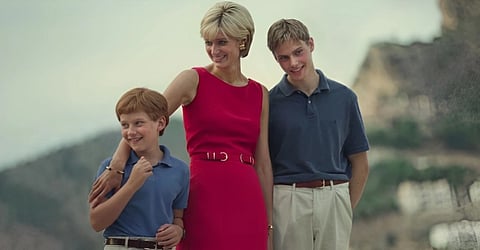

Traditionally, The Crown has been a blend of prestige drama and occasional soapy moments, but with this latest installment, the balance seems to have tipped dramatically. The first three episodes chronicle just the last eight weeks of Diana's life, with the fourth episode delving into the tragic car crash and subsequent funeral. The meticulous recreation of this short timeframe might test the patience of viewers not fervently devoted to the People's Princess.
In its sixth season, The Crown has transformed into what can only be described as "The Diana Show," focusing intensely on the tragic last weeks of Princess Diana's life. While the cast delivers stellar performances, the series is marred by what some critics are calling bad writing and a descent into soap opera territory.
Despite the uniformly brilliant performances from the cast, including Elizabeth Debicki as the enigmatic Diana, the series appears to be losing its grip on the delicate tightrope between high-quality drama and soap opera indulgence. Imelda Staunton's portrayal of Queen Elizabeth, although skillful, is overshadowed by a narrative that seems to be spiraling out of control.
The narrative, reminiscent of a Hallmark movie, paints Diana as a virtual saint marked for tragedy at every turn. The series highlights her philanthropic efforts, her role as a loving mother, and her romance with Dodi Fayed, all while foreshadowing her untimely demise. The portrayal of Diana's postmortem impact on the nation feels labored, with every emotional beat seemingly telegraphed in advance, leaving little room for subtlety or surprise.
The Crown takes an unexpected turn into the supernatural with the introduction of Ghost Diana, who appears to both Prince Charles and Queen Elizabeth as a guiding presence. This plot device, described as a "ministering angel," prompts cringe-worthy moments as Ghost Diana offers Charles gratitude for his hospital demeanor and implores the Queen to show more emotion. These scenes, veering into the absurd, leave viewers questioning the creative choices made by the show's producers.
The dialogue, once a strong suit of the series, has devolved into what some critics deem as "typing-not-writing." The script lacks the nuanced craft seen in earlier seasons, relying on clichéd lines and melodramatic exchanges. The emotional resonance of the series now hinges on small, genuine moments, but even these are tinged with voyeuristic tendencies.
The late-period of The Crown is additionally hindered by its proximity to living memory. Viewers, intimately familiar with the events portrayed, are left grappling with questions about the accuracy of certain depictions. The series attempts to insert Prince Philip's explanation to Harry during the funeral procession, but the audience, effectively present during those moments in history, is left skeptical.
In conclusion, The Crown Season 6, fixated on the life and death of Princess Diana, seems to have lost its narrative finesse. Despite a talented cast and occasional glimpses of emotional potency, the series descends into the realm of bad writing, crass storytelling, and, at times, unintentional absurdity. As Ghost Diana dances among ruins, The Crown struggles to maintain the dignity and sophistication that once defined its earlier seasons.
Watch Trailer